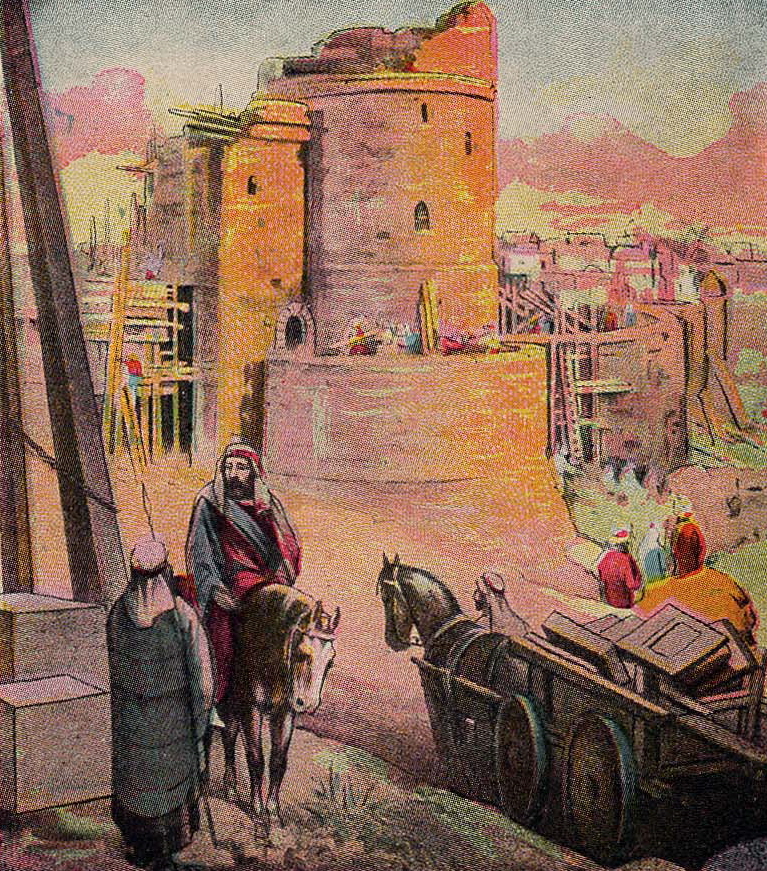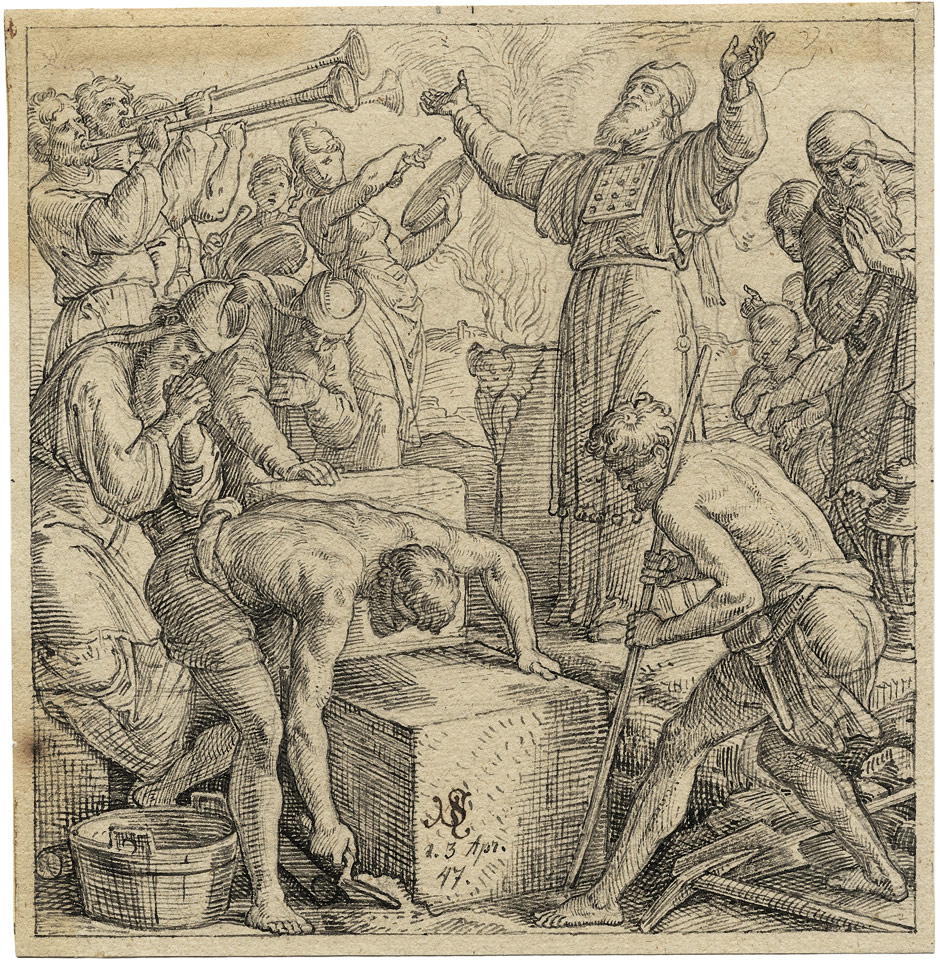
470 BC to 450 BC, Psalm 24: The walls of Jerusalem.
This site was first built in French (see www.147thgeneration.net). The English translation was mainly done using « google translation ». We have tried to correct the result of this translation to avoid interpretation errors. However, it is likely that there are unsatisfactory translations, do not hesitate to communicate them to us for correction.
(for that click on this paragraph)
Summary
This generation is from the years 470 BC to 450 BC
According to our count, this generation is the 24th generation associated with Psalm 24. It is in this Psalm 24 that we therefore find an illustration of the facts of this generation.
xxThis generation corresponds to the first part of the reign of King Persia Artaxerxes I, successor of King Ahasuerus. The restoration of Jerusalem was initially limited to the altar and then to the Temple itself. This generation and the next will be the occasion for a new impetus that will ultimately restore Jewish authority in the land of Israel.
The situation in the land of Israel is worrying. Those who have settled down there are in a very bad and humiliating situation; the wall of Jerusalem is breached, and its gates were burned with fire.
The prophet Nehemiah was overwhelmed and turned to God. His intervention intervenes on the border of this generation and the next. The purpose of Nehemiah will be to finally restore Jerusalem’s past greatness and restore the divine service there. This is reflected in David’s interrogations in the following verses of the psalm.
Nehemiah, who went to Jerusalem, manages to complete the reconstruction of the walls of Jerusalem with the help of all the Judeans who are present there.
Talk
Nehemiah’s dismay
This generation corresponds to the first part of the reign of King Persia Artaxerxes I, successor of King Ahasuerus. The restoration of Jerusalem was initially limited to the altar and then to the Temple itself. This generation and the next will be the occasion for a new impetus that will ultimately restore Jewish authority in the land of Israel.
These generations are illustrated by the texts of the contemporary Nehemiah prophet of Artaxerxes.
When Nehemiah learns the situation of the Jews who live in the land of Israel, he feels a great distress and relies on God:
- The[1] words of Nehemiah the son of Hacaliah. And it came to pass in the month of Kislev [in] the twentieth year that I was in Shushan the capital.
- There came Hanani, one of my brethren, he and men from Judea, and I asked them about the Jews who had escaped, who remained of the captivity, and about Jerusalem.
- And they said to me, « The remnant who remained of the captivity in the province are in great trouble and reproach; and the wall of Jerusalem is breached, and its gates were burned with fire. »
- And it came to pass when I heard these words that I sat and wept, and I mourned for days, and I fasted and prayed before the God of heaven.
- And I said, « I beseech You, O Lord God of heaven, the great and awesome God, Who keeps the Covenant and loving-kindness to those who love Him and to those who keep His commandments.
- Let Your ear now be attentive and Your eyes open to listen to the prayer of Your servant, which I pray before You today, day and night, concerning the Children of Israel, Your servants, and I confess the sins of the Children of Israel, which we sinned against You; and I and my father’s house have sinned.
The eulogy of divine greatness in Nehemiah’s prayer is to be compared to that made by David in the beginning of the psalm of this generation:

- Of David, a song. The land and the fullness thereof are the Lord’s; the world and those who dwell therein.
- For He founded it upon seas and established it upon rivers.
The intervention of Nehemiah intervenes on the border of this generation and the next. The purpose of Nehemiah will be to finally restore Jerusalem’s past greatness and restore the divine service there. This is reflected in David’s interrogations in the following verses of the psalm.
The future that is used as well as in the following verses of the psalm is due to the fact that the action undertaken during this generation will only begin to materialize in the next generation and then be consolidated by the action of Ezra.
So the continuation of the psalm:

- Who will ascend upon the Lord’s mount and who will stand in His Holy place?
- He who has clean hands and a pure heart, who has not taken My name in vain and has not sworn deceitfully.
- He shall receive a blessing from the Lord and charity from the God of his salvation.
- This is the generation of those who seek Him, who seek Your presence-Jacob, forever.
Artaxerxes
After his prayer to God, Nehemiah meets King Artaxerxes to help him in his plans to restore Jerusalem:
- Now[2] it came to pass in the month of Nissan, in the twentieth year of King Artaxerxes, [that they brought] wine before him, and I carried the wine and gave [it] to the king. And I had never been sad in his presence.
- And the king said to me, « Why do you have a sad countenance? You are not ill. This is nothing but wickedness of heart. » And I became very frightened.
- And I said to the king, « May the king live forever! Why should my countenance not be sad when the city, the place of my forefathers’ graves, is laid waste, and its gates are consumed by fire? »
- And the king said to me, « For what do you make request? » And I prayed to the God of heaven.
- And I said to the king, « If it pleases the king, and if your servant is pleasing before you, that you send me to Judea, to the city of the graves of my forefathers, and I shall build it. »

King Artaxerxes accedes to Nehemiah’s petition. This one can arrive at Jerusalem and initialize his project not without discontenting the opposing peoples of Israel which occupied then the ground:
- Now[3] Sanbalat the Horonite and Tobiah the Ammonite slave heard, and it displeased them greatly, that a man had come to request good for the Children of Israel.
- And I came to Jerusalem, and I was there for three days.
- And I and a few men with me arose at night, and I did not tell anyone what my God had put into my heart to do for Jerusalem, and there were no animals with me except the animal upon which I was riding.
- And I went out through the Gate of the Valley at night and toward En Hattannin and to the Dung Gate, and I was breaking the walls of Jerusalem, which were breached, and its gates [which were] consumed by fire.
- And I passed to the Fountain Gate and to the king’s pool, and there was no place for the animal that was under me to pass.
- And I ascended by the valley at night, and I broke into the wall, and I returned and came into the gate of the valley, and I returned.
- And the prefects did not know where I went and what I was doing, and the Jews, the priests, the nobles, the prefects, and the remaining performers of the work I had not yet told.
- And I said to them, « You see the sad state we are in, that Jerusalem is laid waste, and its gates have been burned with fire; come and let us build the wall of Jerusalem, and we shall no longer be a reproach. »
The rebuilding of the walls of Jerusalem
This is obviously associated with the shared hostility of other peoples:
- Then[4] Sanbalat the Horonite, and Tobiah the Ammonite slave, and Geshem the Arab heard, and they mocked us and despised us, and they said, « What is this thing that your are doing? Are you rebelling against the king? »
- And I answered them a word, and I said to them, « The God of heaven-He will make us succeed, and we, His servants, will get up and build, but you have no share, charity, or remembrance in Jerusalem. »
Despite the attacks and plans devised by other peoples, Nehemiah managed to complete the reconstruction of the walls of Jerusalem[5] with the help of all the Judeans present in Jerusalem:
- Now[6] it came to pass, when the wall had been built and I had erected the doors, that the gatekeepers, the choristers, and the Levites were appointed.
- And I put Hanani my brother and Hananiah the ruler of the castle charge over Jerusalem, for he is indeed a truthful man, and he has feared God for a long time.
The city of Jerusalem was finally ready to receive the Lord again in the Temple of Zion, as expressed in the following psalm:

- [You] gates, lift your heads and be uplifted, [you] everlasting portals, so that the King of Glory may enter.
- Who is this King of Glory? The Lord, Who is strong and mighty, the Lord Who is a mighty warrior.
- [You] gates, lift your heads and lift up, [you] everlasting portals, so that the King of Glory may enter.
- Who is this King of Glory? The Lord of Hosts-He is the King of Glory forever.

[1] Nechemiah – Nehemiah – Chapter 1, verses 1 to 6, see also the continuation of the prayer on verses 7 to 11.
[2] Nechemiah – Nehemiah – Chapter 2, verses 1 to 5
[3] Nechemiah – Nehemiah – Chapter 2, verses 10 to 17
[4] Nechemiah – Nehemiah – Chapter 2, verses 19 and 20
[5] Nechemiah – Nehemiah – Chapter 3 to 6
[6] Nechemiah – Nehemiah – Chapter 7, verses 1 and 2
